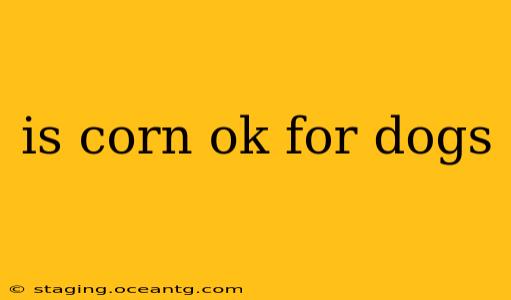Corn is a common ingredient in many dog foods, but the question of whether it's okay for dogs is more nuanced than a simple yes or no. While not inherently toxic, corn's suitability for canine consumption depends on several factors, including the type of corn, the amount fed, and your dog's individual health needs. Let's delve into the details.
Is Corn Toxic to Dogs?
No, corn itself isn't toxic to dogs. However, it's not a highly digestible carbohydrate for them, and certain forms can pose problems. The key lies in understanding the differences and potential risks.
What Kind of Corn is Safe for Dogs?
Generally, cooked corn is safer than raw corn. Raw corn kernels can be difficult for dogs to digest and may cause gastrointestinal upset. Cooked corn, on the other hand, is easier to digest and less likely to cause problems. Avoid giving your dog canned corn, as it often contains high levels of sodium and added sugars that are unhealthy for dogs. Similarly, popcorn, while not toxic, presents a choking hazard due to its size and texture.
How Much Corn Can a Dog Eat?
Corn should only be given as an occasional treat in small quantities. It's not a necessary part of a balanced canine diet, and excessive consumption can lead to weight gain and digestive issues. Consider corn as a supplementary treat, not a staple food.
Can Dogs Eat Corn on the Cob?
No, it's generally not advisable to give dogs corn on the cob. The cob itself presents a significant choking hazard and can cause intestinal blockages if ingested. Even small pieces of cob can pose a risk. Always remove kernels from the cob before offering any corn to your dog.
What Happens if a Dog Eats Too Much Corn?
Overconsumption of corn can lead to several problems:
- Digestive upset: Diarrhea, vomiting, and gas are common symptoms of corn intolerance or overindulgence.
- Weight gain: Corn is relatively high in carbohydrates and can contribute to obesity if fed in large quantities.
- Allergies: Some dogs are allergic to corn, experiencing symptoms such as skin irritation, itching, and digestive problems.
My Dog Ate Corn, Should I Be Worried?
If your dog ate a small amount of cooked corn, it's likely not a cause for concern. Monitor your dog for any signs of digestive upset. However, if your dog consumed a large quantity of corn, particularly raw corn or corn on the cob, contact your veterinarian immediately.
What Are Good Alternatives to Corn in Dog Food?
Many dog food brands offer corn-free options, utilizing other carbohydrates like sweet potatoes, brown rice, or barley as alternatives. These ingredients are often considered more easily digestible for dogs. Always consult with your veterinarian to determine the best dietary choices for your dog based on their breed, age, and health status.
Is corn good for dogs with allergies?
No, corn is a common allergen for dogs. If your dog has allergies, it's best to avoid corn altogether. Look for dog food clearly labeled "corn-free" to ensure it does not contain any corn products.
Can corn cause pancreatitis in dogs?
While not a primary cause, some research suggests a possible link between high-fat diets containing corn and an increased risk of pancreatitis in certain dog breeds. It's crucial to maintain a balanced diet to mitigate this risk. Consult your vet for personalized dietary recommendations.
This information is for general knowledge and should not replace professional veterinary advice. Always consult your veterinarian with any questions or concerns about your dog's diet. Remember, every dog is different, and what's suitable for one may not be for another.
